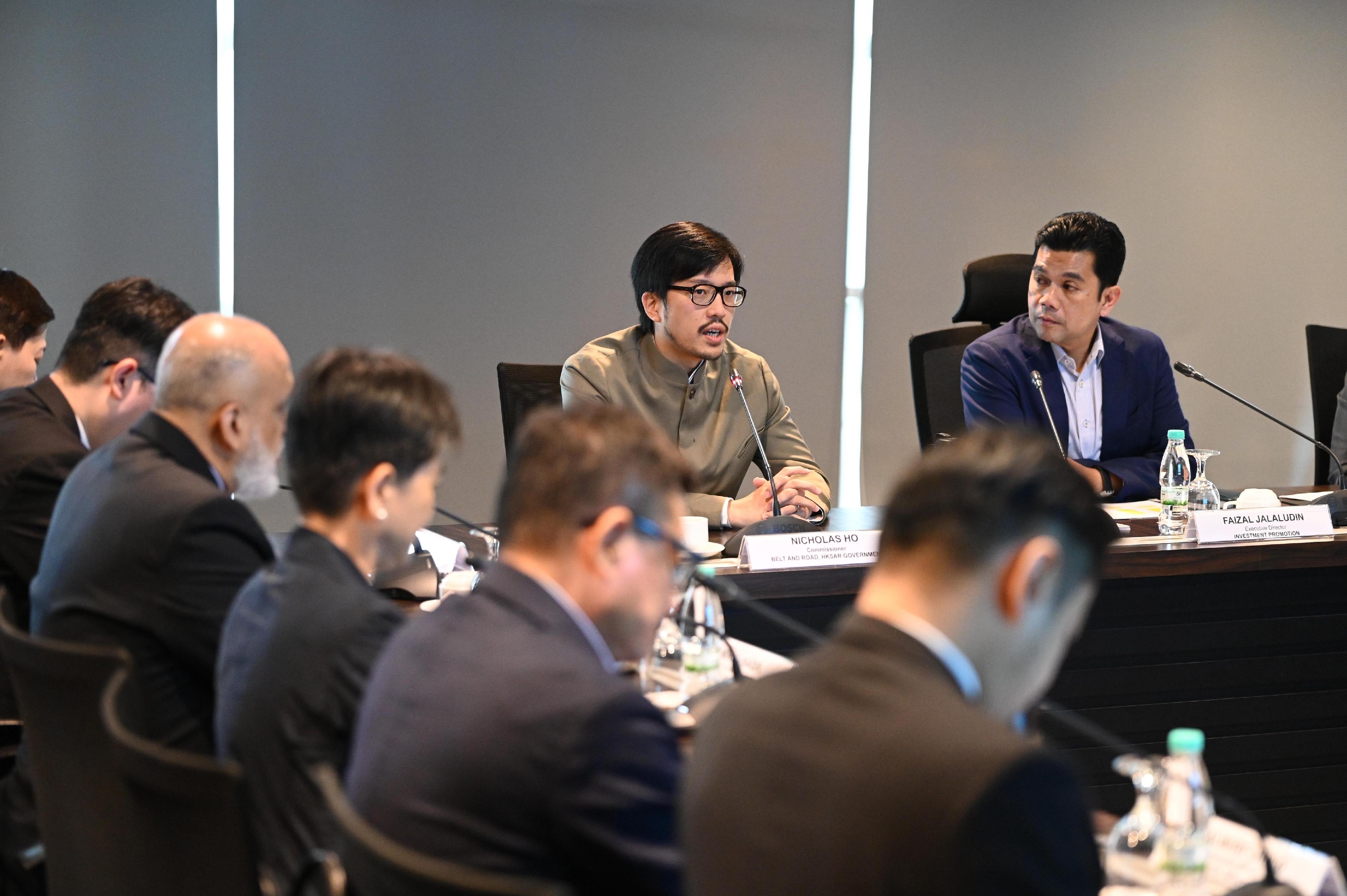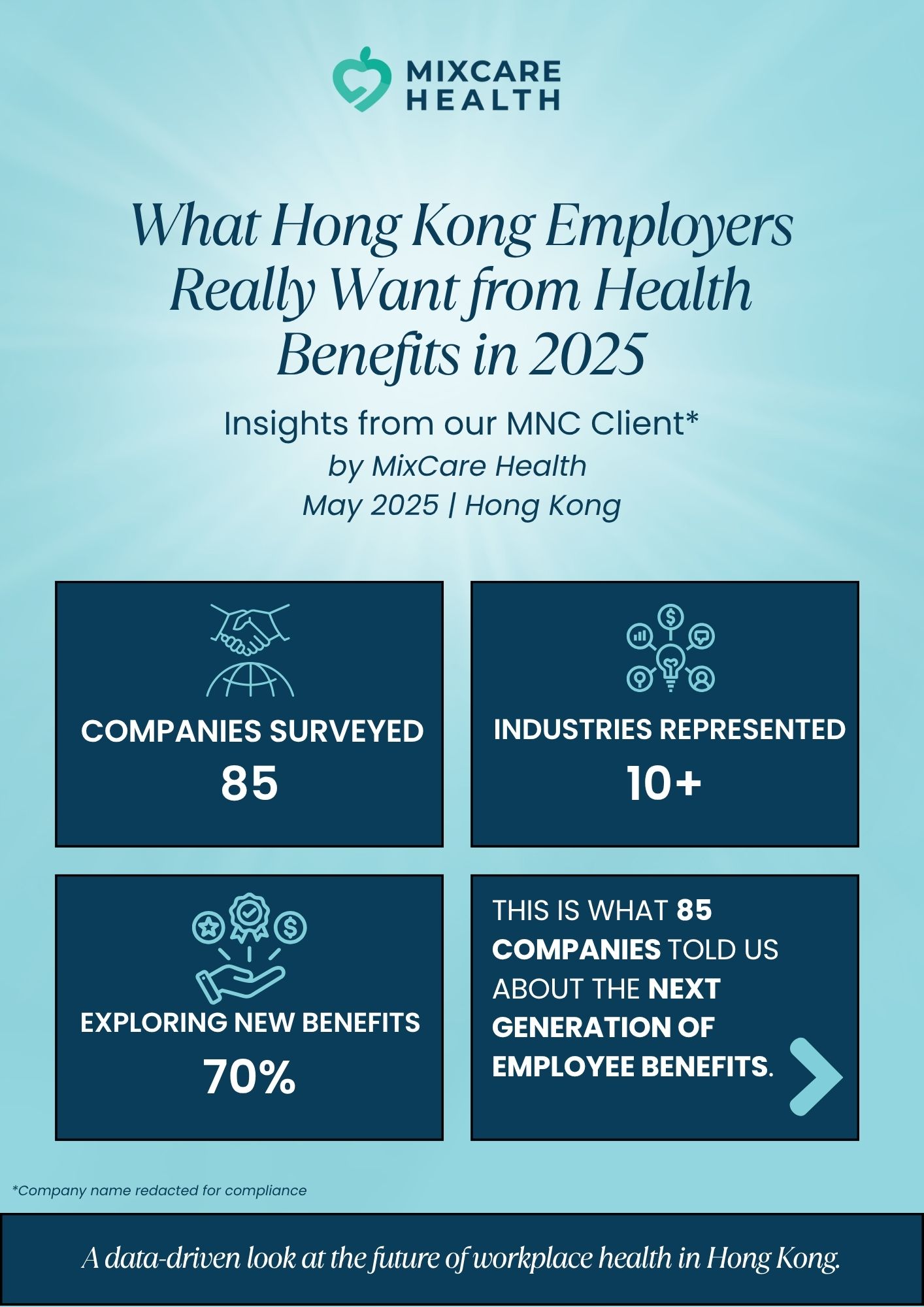(24/6-30/6) Hong Kong HR Trends & Workplace Insights – Weekly HR Newsletter
As Hong Kong reclaims its title as Asia’s top business hub, a clear message is emerging: the city is open for growth—and top talent will be the first to move. In this week’s MixCare Weekly, we examine how Hong Kong’s resurgence is creating new opportunities and challenges for HR, especially in finance, legal, and digital roles.
We also unpack the rise of borderless hiring in Asia-Pacific, what Singapore’s rising stress levels say about employee well-being, and how the sudden collapse of Taipan Bread & Cakes exposed dangerous gaps in HR crisis planning.
Whether you’re building global teams or protecting local ones, these headlines reveal the pressing need for HR to lead with agility, resilience, and vision.
1. Singapore workforce more confident, but rising stress and falling job satisfaction create a widening rift

One-minute summary
Despite increasing confidence in Singapore’s job market, a new report from Cigna Healthcare reveals a growing disparity between employees’ workplace outlook and their personal well-being. While 73% of workers feel secure in their roles, 53% report moderate to high daily stress levels, and younger employees—particularly Millennials—have seen a sharp drop in job satisfaction. The data highlights how meaningful work does not always translate into lower stress. Mental health concerns are rising, and employers are urged to reconsider how they approach wellness, career progression, and support systems. This signals a need for proactive HR leadership to align employee experience with actual organisational care.
3 main takeaways
-
Employee confidence is rising, but mental health is deteriorating.
Workers feel more secure in their roles, but stress levels are climbing rapidly across industries. This contradiction highlights that emotional and psychological safety are now just as vital as job security. -
Millennials and Gen Z face the steepest drop in satisfaction.
These generations want purpose, support, and flexibility—but often feel disappointed by rigid, top-down management structures. Their disengagement could pose a long-term talent pipeline risk for organisations that don’t adapt. -
Wellness initiatives are not matching employee needs.
A gap exists between HR program intent and how supported employees actually feel, calling for more employee-driven approaches. It’s no longer about offering perks but about building real systems of care and trust.
Implications to employees
-
Employees may disengage or burn out despite job security.
Quiet quitting and productivity declines are likely if emotional needs are unmet. Over time, this could erode team morale and innovation across entire departments. -
Younger staff may look for emotionally intelligent employers.
They’ll prioritise workplaces with clear mental health support, mentorship, and authenticity. Companies that fail to evolve risk losing top junior and mid-level talent to more human-centric competitors. -
Trust in HR may decline if wellness feels performative.
Employees will scrutinise whether actions match claims—impacting HR’s internal credibility. Rebuilding this trust requires consistency, transparency, and follow-through at every level.
Implications to HR
-
Time to reframe KPIs around emotional engagement, not just output.
Introduce manager check-ins, anonymous pulse surveys, and burnout risk indicators. These should be integrated into performance reviews and business health dashboards alike. -
Create flexible and inclusive career pathways.
Redesign performance evaluations to reward adaptability, not just deliverables. Employees need to see how growth and well-being are both valued in your career model. -
Double down on mental health infrastructure.
Peer coaching, therapist access, and manager training on empathy should be core features, not add-ons. This shift will shape not just retention but also company culture and employer brand.
Source: HRM Asia
2. The borderless workforce: Navigating the new era of global hiring in Asia-Pacific

One-minute summary
A new report from Deel highlights a major shift in Asia-Pacific’s hiring landscape: over 78% of organisations are planning to make 60% or more of their workforce remote. This is not a pandemic-era experiment but a long-term shift in talent strategy, driven by access to diverse global skillsets, operational flexibility, and cost optimisation. Singapore, Australia, and increasingly, Hong Kong, are embracing cross-border hiring enabled by platforms like Deel, Rippling, and Remote. While the opportunities are vast, they come with operational complexities—from compliance and payroll to onboarding and cultural cohesion—that HR must be equipped to navigate. It’s a defining moment for APAC HR to step into the global stage.
3 main takeaways
-
Remote work is no longer a perk—it’s a core recruitment and business strategy.
Companies are expanding their talent pools across borders to fill roles faster and reduce costs. The shift marks a permanent evolution in how we define “office culture” and geographic boundaries. -
Cross-border compliance is becoming a key HR capability.
Managing employment laws, tax reporting, and benefits across jurisdictions is now a central HR responsibility. Non-compliance can lead to legal risks and reputational damage in new markets. -
HR tech platforms are critical infrastructure in global hiring.
Tools like Deel, Remote, and Papaya Global help automate payroll, benefits, and legal documentation across countries. These systems are becoming as essential as HRMS and ATS platforms.
Implications to employees
-
Employees now face global competition—and global opportunity.
High performers can access international careers without relocating, but average performers may face redundancy from cheaper global alternatives. Upskilling is now survival. -
Remote onboarding is the new first impression.
A poor virtual onboarding experience can sour the employee experience before it begins. Companies must invest in digital-first orientation, buddy systems, and early engagement. -
Career pathways will flatten and decentralise.
With distributed teams, promotions and mentorship may no longer follow traditional office dynamics. Employees must learn to self-advocate and manage upwards in virtual settings.
Implications to HR
-
Global-first hiring policies must be embedded into recruitment SOPs.
HR should align job descriptions, compensation structures, and contracts to reflect multi-country realities. Ensure hiring managers are equipped to recruit across time zones and cultures. -
Cultural cohesion becomes a strategic HR goal.
Without a physical workplace, HR must design new rituals—virtual town halls, digital recognition, and inclusive communications—to foster belonging across continents. -
Prepare for “talent liquidity” in workforce planning.
Talent will flow more freely between companies and countries. HR leaders must think like economists: where is talent abundant, affordable, and aligned to our growth?
Source: HRM Asia
3. Closure of Taipan Bread & Cakes leaves millions in unpaid wages and rent

One-minute summary
Hong Kong bakery chain Taipan Bread & Cakes abruptly shut down on 24 June, leaving behind over HK$10 million in unpaid wages to hundreds of employees and outstanding rent to landlords. The closure happened with little warning—employees were informed just hours prior, and many were not given severance, termination letters, or access to HR support. Labour unions have criticised the lack of regulatory enforcement and are calling for stronger worker protections during business failures. This incident reveals vulnerabilities in Hong Kong’s employment protections and underlines the need for companies to have ethical exit plans and legal safeguards for employees, especially in volatile industries.
3 main takeaways
-
Hundreds of employees were dismissed without notice or compensation.
Workers were left stranded, some without even formal termination documentation. This reflects a dangerous gap in corporate accountability and labour enforcement mechanisms. -
The brand’s abrupt exit triggered industry-wide concerns.
Beyond the financial damage, trust in employers—especially in traditional local businesses—has taken a reputational hit. Other companies may now face closer scrutiny from staff and regulators. -
Labour unions are demanding stricter insolvency regulations.
Public pressure is mounting for legislative changes to protect wages and severance during company closures. Government intervention may soon be on the agenda.
Implications to employees
-
Employees may feel vulnerable across industries, even in stable roles.
The psychological ripple effect of such closures erodes faith in employer stability. This may drive a surge in job-hopping or demand for job security guarantees. -
Staff are likely to scrutinise contract clauses more closely.
From payout guarantees to notice periods, employees will increasingly assess the strength of their employment terms—and demand improvements before signing. -
Workers may turn to collective bargaining or unions for protection.
As confidence in employer goodwill wanes, organised labour may become more attractive. This shift could alter the employee-employer power dynamic in Hong Kong.
Implications to HR
-
Crisis management and exit protocols must be formalised.
HR needs detailed SOPs for handling financial distress and employee offboarding. This includes clear timelines, legal templates, and proactive communication plans. -
HR has a moral duty—even in insolvency.
Abandoning employees without closure reflects poorly not just on leadership, but on the HR function itself. Ethical HR means showing up, even in the final chapter. -
Now is the time to review employment contracts and severance policies.
Contracts should include protective clauses, early warning systems, and contingency communication strategies. HR leaders should also audit legal compliance on terminations.
Source: The Standard
4. HK rated No.1 over Singapore, Tokyo as global business hub

One-minute summary
Hong Kong has reclaimed its top position as the most competitive business hub in Asia, outperforming Singapore and Tokyo in the latest Global Financial Centres Index. Key strengths include a robust legal system, international connectivity, and ongoing investments in fintech and digital infrastructure. While geopolitical concerns persist, the report credits the city’s resilience and deep professional services ecosystem for its rebound. For HR professionals, this renewed positioning will likely lead to more business expansions, intensified demand for skilled professionals, and higher competition for top-tier talent in sectors such as finance, law, and tech. It also offers an opportunity to reinforce employer branding on the world stage.
3 main takeaways
-
Hong Kong tops the regional list in global competitiveness rankings.
Its legal infrastructure, proximity to China, and robust banking system have helped it overtake rivals like Singapore and Tokyo. This can restore international business confidence. -
Demand is rising in finance, legal, and digital industries.
With increased investor interest and company HQ setups, hiring in these sectors is set to accelerate. Firms will likely struggle to attract and retain enough experienced talent quickly. -
The city’s fintech readiness is being recognised.
With regulatory support and talent pipelines expanding, digital infrastructure is no longer just a vision—it’s a tangible growth lever.
Implications to employees
-
There will be more cross-border and leadership opportunities.
Employees with international experience and language fluency will be in high demand. Mobility programs and regional roles will become more accessible. -
The competition for top roles will intensify.
Professionals will need to sharpen both technical and soft skills, as global firms benchmark local candidates against international standards. -
Employees may seek out ’employer prestige’ as a career asset.
Working for firms aligned with Hong Kong’s global outlook will carry new weight on CVs—especially among mid-career professionals and high-potential talent.
Implications to HR
-
Attracting world-class talent will require more than salary.
EVP must reflect growth, purpose, and cross-border mobility. HR teams should highlight culture, leadership quality, and learning opportunities in recruitment. -
Global mobility programs must be scaled.
Companies will need to support secondments, visa support, and smooth onboarding to remain competitive in international hiring markets. -
Retention strategy needs to reflect ‘global-ready’ aspirations.
High-potential employees want to work with global clients, take on leadership projects, and be part of something bigger. Career paths must reflect this ambition.
Source: The Standard
5. HK promotes professional services in Indonesia and Malaysia to boost Belt and Road cooperation

One-minute summary
Hong Kong has stepped up its Belt and Road engagement by promoting its professional services—particularly in legal, accounting, architecture, and engineering—across Indonesia and Malaysia. Led by Financial Secretary Paul Chan, the delegation met with key government and business stakeholders in both countries, positioning Hong Kong as a value-added partner in infrastructure and development projects. The push signals a pivot in Belt and Road participation: from being a financial conduit to becoming a professional services hub in Southeast Asia. For HR leaders, this opens up possibilities for regional expansion, mobile talent deployment, and cross-border project staffing—especially in high-skilled white-collar sectors.
3 main takeaways
-
Hong Kong is now exporting knowledge, not just capital.
The city is promoting its service-sector strengths, such as legal and engineering expertise, as key contributions to regional infrastructure projects. This signals a maturing of the Belt and Road initiative. -
Indonesia and Malaysia are seen as growth markets.
The delegation’s focus on Southeast Asia highlights where future collaboration—and talent demand—will concentrate. Professional services firms will see more regional work. -
This initiative positions Hong Kong as ASEAN’s intellectual capital partner.
It reinforces the city’s value as a hub for project governance, consulting, and oversight—not just execution.
Implications to employees
-
Project-based and international mobility roles will rise.
White-collar professionals in legal, finance, and engineering may be offered short- to mid-term assignments across ASEAN markets. These experiences will boost career progression. -
Language and cross-cultural skills will gain greater value.
Employees fluent in Bahasa, Malay, or with ASEAN exposure will have an edge in client-facing roles. Understanding regional business etiquette will also be a key asset. -
Increased visibility to global clients may shift expectations.
Employees will be expected to perform in high-stakes, cross-border settings. Strong communication, adaptability, and cross-functional skills will be key to success.
Implications to HR
-
Start grooming ASEAN-ready talent pipelines.
Identify high-potentials with language skills, cultural intelligence, and willingness to relocate. Map out strategic workforce plans for international deployments. -
Refine mobility policies to support outbound secondments.
Ensure housing, compliance, and family support are structured for Southeast Asia assignments. Mobility must be seen as a leadership track, not a reward. -
Use this regional momentum to boost internal engagement.
Frame ASEAN projects as part of your company’s growth story. Involve internal comms, L&D, and performance management to align everyone behind this vision.
Source: The Standard
The Future of Employee Benefits | MixCare Report 2025
Benefits aren’t just perks anymore—they’re powerful tools for retention, engagement, and ROI. In our latest report, we unpack how leading employers in Hong Kong are rethinking their approach with flexible, cost-effective strategies like FSAs, wellness services, and recognition programs. Backed by fresh market data, this report offers practical takeaways for HR leaders who want to align benefits with workforce needs and business outcomes.


[formidable id=”11″]
